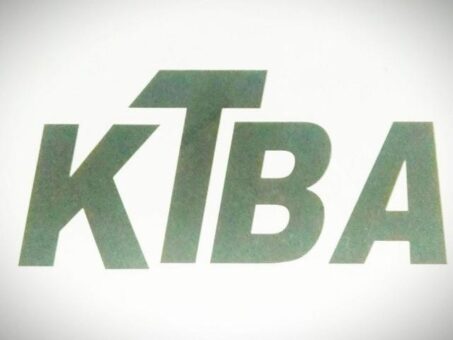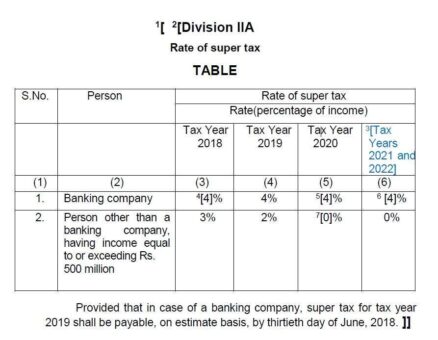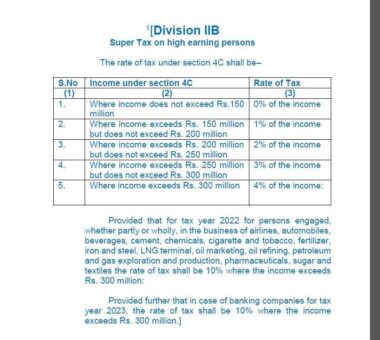ISLAMABAD: Federal Board of Revenue (FBR) has extended the date for providing details of deemed income of immovable property up to December 31, 2022, where annual returns have already filed.
In this regarding the FBR issued SRO 2052(I)/2022 on November 22, 2022 to introduce draft amendments to Income Tax Rules, 2002. Through the draft rules, the FBR proposed that a form which required details of income from immovable properties under Section 7E of the Income Tax Ordinance, 2001 can be filed up to December 31, 2022.
Prior to this the FBR issued SRO 1891 (I)/2022 on October 13, 2022 to launched the form and directed taxpayers to submit the same along with the annual income tax returns up to October 31, 2022. Although the date for filing annual income tax return for tax year 2022 has been extended up to November 30, 2022 but taxpayers are facing difficulties in fulfilling the requirement envisaged in the form.
It also created a legal complication as many returns for tax year 2022 were filed prior to issuance of the form making it difficult for the taxpayers to make changes in their forms.
In the latest SRO, the FBR stated: “Provided that where return has been furnished prior to coming into force of notification No. SRO 1891(I)/2022, dated October 13, 2022, the form specified in the said notification shall be furnished separately by December 31, 2022.”
On October 27, 2022, Karachi Tax Bar Association (KTBA) after the issuance of the SRO 1891, sent a communication to the FBR chief apprising about the challenges in filling 7E details.
The KTBA had pointed out that the issue of property values for the purpose of Section 7E of the Ordinance i.e. Deemed Income on Capital Assets.
“It is recalled that we stressed the need for incorporating the values given under the forty-two (42) notification (SROs) issued by the FBR in the month of March 2022 for property valuations under Section 68 of the Ordinance in the IRIS.
“It was recommended that those valuation tables were to be incorporated in the back end working of the income tax return in the IRIS after which the calculation of tax under Section 7E could be calculated automatically by the system, based on the description of property incorporated by the taxpayer in its wealth statement.
“It is re iterated that had this been done, it would ensure swift and correct computation of 20% tax on 5% value under Section 7E of the Ordinance and would avoid any standard deviation therefrom.
A NEW 7E ANNEXURE:
We would now like to invite your kind attention towards a “new set of requirement” which has been ventured in the IRIS and what now has become a bigger concern in context of Section 7E i,e, the new 7E Annexure. This annexure has lately been introduced in IRIS on 13th October 2022. We at the KTBA hold a considered view that it is unnecessarily a detailed format for a taxpayer or his advisor to fill and that too in these last days of tax returns filing.
Uncalled for Details:
The new annexure contains all the possible and imaginable categories of properties one could have. A basic list is being reproduced hereunder:
i. Agricultural Property
ii. Commercial Property
iii. Industrial Property
iv. Residential Property
v. Educational Property
vi. Health Property
vii. Natural Property
viii. Public Property
ix. Religious Property
x. Mixed Use Property
Your office would appreciate that apart from the first four (04) categories, the rest of the six (06) are not only unheard of in the domestic culture or tax laws of the country but these are not even owned by an individual in the first place. What is worrisome is that there are duplications and triplications to be filled in for the same property, which will surely give rise to issuance of uncalled for show cause notices by the department. The rational, therefore, needs to be thrashed out.
Fields for Property Details:
The Annexure incorporated vide SRO 1892 of 2022 dated 13th October 2022, with its fine details may have either been designed bespoke or borrowed from external source but only suitable to be made applicable where there is plenty of days and manhours left with to work on the same, not only fifteen (15) days and that too where these details do not add any value to the information.
The details of properties which have been required to be filled in, are details consisting of the following, which, your office would acknowledge, are completely irrelevant for purpose of valuation of property under Section 68 of the Ordinance.
i. Town Area of property
ii. Tehsil of Property
iii. Age of property
These are superfluous fields which have been required to be filled without any impact but have been made mandatory fields as without filling which one cannot move forward in IRIS and cannot proceed to file return. This is a serious deterrence.
Needless to mention that the size of the property and size of the built up or covered area with the name of City and location in the city are the only necessary data for valuation of property under the Ordinance as that is what is precisely needed not the town and tehsil, which is other as well is a cumbersome detail to be extracted.
Details for Exempt Properties:
It also merits a mention that above cumbersome details have been required to be punched in even in cases where there would not arise any liability on account of Section 7E or where the properties of the taxpayer are exempted from the purview of the provision. We understand that submission of details of the following exempted properties should also be exempted, which will actually be a facilitation in filing of return at least for those who do not have to pay this 1% tax;
1. Single self-owned property
2. Self-owned business properties
3. Self-owned agriculture land under cultivation
4. Fair market value of property less than Rupees 25 Million
5. Rented Properties
6. Properties purchased during the year with tax deposited CPR under Section 236K.
Valuations of Properties and Position of Valuation SROs
As for the valuation tables and the valuation SROs, it is critical for us to apprise your office that picking up the value from the SROs is not as easy as has recently been spelt out by the FBR. There are altogether forty-two (42) notifications (SROs) for the purpose, which were issued in the month of March 2022.
Out of these forty-two (42) SROs, twenty-eight (28) have been amended to date. Upon finding the applicable SRO for any city the portal provides you with the latest one. One consequently would need to search and recheck for the older SRO once again on the website. This is certainly time taking and painstaking exercise.
Secondly if a certain SRO has been amended, there is no amended SRO available in the cache, consequent to which the propensity to commit an error by taking the valuation from the older SRO gets certain.
In order to avoid such an impending consequence, the FBR should provide the final amended SRO of valuation failing to which the taxpayer will have to keep switching from older SRO to amended SRO or will commit the suspected error. This goes without saying as how much time consuming this exercise can become besides being tedious and painstaking.
Size of Notifications
It should not loose the sight of the regulator that apart from the amended Notifications, there are few SROs, which are unusually lengthy and detailed. This makes the job of the taxpayers even more arduous to keep sifting the pages to find for the precise location of his property therein. It would be worthwhile to enlist hereunder few of these:
i. Bahawalnagar is of 191 pages
ii. Bahawalpur is of 51 pages
iii. Multan is of 4,593 pages
iv. Faisalabad is of 4,712 pages
v. DG Khan is of 4,722 pages
vi. Quetta is of 28 pages
vii. Lahore is of 31 pages
The above have been quoted for giving few instances as to the ordeal your taxpayer will have to go through for filing your requirements, which is by any stretch of rational thinking is unwarranted.
Timing of Introduction of 7E Annexure:
And all of this has fallen due merely in the last fifteen days of October. Your office would appreciate that the timing of introduction of the 7E Annexure requires reconsideration. The Tax Return and their other Annexure were though introduced withing the legal time frame on June 30, however, the 7E Annexure was introduced on September 3rd, 2022, vide SRO 1829 of 2022 in draft form and finalized and uploaded on IRIS just after 10 days on Sep 13th, 2022 vide SRO 1891 of 2022. This is not less than three and a Half (3.5) months late.
REQUEST FOR A TUTORIAL AND DEMO PRESENTATION
Based on the forgoing it would be appropriate for us at the Bar to place genuine request in your office to kindly direct either the field formation or the relevant IT team to prepare at least a tutorial or to say a Demo Presentation for the basic level assistance of the taxpayers. The same can be placed on the website.







